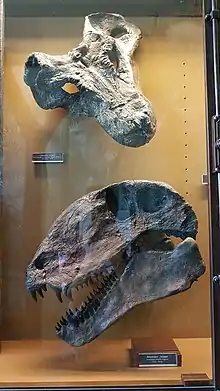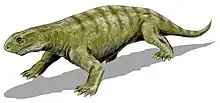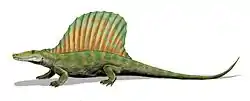Sphenacodontoidea
Sphenacodontoidea is a node-based clade that is defined to include the most recent common ancestor of Sphenacodontidae and Therapsida and its descendants (including mammals). Sphenacodontoids are characterised by a number of synapomorphies concerning proportions of the bones of the skull and the teeth.
| Sphenacodontoids Temporal range: Late Carboniferous-Recent, | |
|---|---|
 | |
| Fossilized skull of two sphenacodontoids : Clelandina (Therapsida, Gorgonopsidae) and a Dimetrodon (Sphenacodontidae). | |
| Scientific classification | |
| Domain: | Eukaryota |
| Kingdom: | Animalia |
| Phylum: | Chordata |
| Clade: | Synapsida |
| Clade: | Sphenacomorpha |
| Clade: | Sphenacodontia |
| Clade: | Pantherapsida |
| Clade: | Sphenacodontoidea |
| Clades | |
The sphenacodontoids evolved from earlier sphenacodonts such as Haptodus via a number of transitional stages of small, unspecialised pelycosaurs.
Classification
The following taxonomy follows Fröbisch et al. (2011) and Benson (2012) unless otherwise noted.[1][2]
Class Synapsida
- Sphenacodontoidea
- Family †Sphenacodontidae
- Therapsida
See also
References
- Jörg Fröbisch; Rainer R. Schoch; Johannes Müller; Thomas Schindler; Dieter Schweiss (2011). "A new basal sphenacodontid synapsid from the Late Carboniferous of the Saar-Nahe Basin, Germany" (PDF). Acta Palaeontologica Polonica. 56 (1): 113–120. doi:10.4202/app.2010.0039.
- Benson, R.J. (2012). "Interrelationships of basal synapsids: cranial and postcranial morphological partitions suggest different topologies". Journal of Systematic Palaeontology. 10 (4): 601–624. doi:10.1080/14772019.2011.631042. S2CID 84706899.
This article is issued from Wikipedia. The text is licensed under Creative Commons - Attribution - Sharealike. Additional terms may apply for the media files.





.jpg.webp)